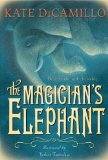Reading Guide Questions

Please be aware that this discussion guide will contain spoilers!
- An author makes a very important choice with the first line of any story. This story begins:
"At the end of the century before last, in the market square of the city of Baltese, there stood a boy . . ."
- Why do you think that Kate DiCamillo made this choice?
- How long ago is the story set?
- Peter has been given money by Vilna Lutz to buy food, but he spends part of it on a fortuneteller instead. In
"Jack and the Beanstalk," Jack makes a similar choice when he trades his cow for five magic beans instead of selling it. Can you think of any other stories that begin with an errand that is waylaid? What makes this an effective narrative device?
- When he is standing in line in the market, Peter overhears the fishmonger say,
"Well, he wasn't much of a magician, and none of them was expecting much, you see — that's the thing. Nothing was expected. . . . He hadn't promised them nothing special, and they wasn't expecting it neither" (page 19).
- Who is the fishmonger talking about?
- What happened that was out of the ordinary?
- How does the unexpected event change the attitude of the city (see pages 55 and 59)?
- Does it affect everyone in the same way?
- Can you think of an unexpected event in your own life that changed you? How?
- In the middle of his usual trick to produce lilies, the magician adds the words of a different spell, even though he knows that
"the words were powerful and also, given the circumstances, somewhat ill-advised. But he wanted to perform something spectacular" (pages 25–26).
- Why do you think he made this choice?
- Given what you know about what happened because of this choice, would you have done the same? Why?
- After her injury, Madam LaVaughn visits the prison every day to speak to
the magician. Every day they say the same things to each other: the magician says that he intended only to produce flowers, and she responds that he doesn't understand that she is crippled. Madam LaVaughn's manservant, Hans, finally says to them:
"It is important that you say what you mean to say. Time is too short. You must speak words that matter" (page 49).
- What inspires him to say this?
- What does he mean?
- When the elephant is on display, the entire city comes to see her. "And everyone, each person, had hopes and dreams, wishes for revenge, and desires for love. They stood together. They waited. And secretly, deep within their hearts, even though they knew it could not truly be so, they each expected that the mere sight of the elephant would somehow deliver them, would make their wishes and hopes and desires come true" (pages 113–114).
- Can you think of any people or events in contemporary society that have made people feel the same way?
- If the same thing were to happen tomorrow, do you think we would experience it differently? How?
- After Peter sees the elephant in the ballroom, he promises to help her. But as he walks away, he feels that it was the worst kind of promise to make (page 130)Why? Have you ever done the same?
- Faith and hope are central themes in this story. Peter believes that if he can find the elephant, he will find his sister. This faith overcomes even his doubt that he can keep his promise. As he asks the other characters to join him, they each believe because he asks them to. The elephant believes most of all:
"In the ballroom of the countess Quintet, when the elephant opened her eyes and saw the boy standing before her, she was not at all surprised. She thought simply, You. Yes, you. I knew that you would come for me" (page 173).
- How would the story have unfolded if Peter had not believed?
- What other examples of faith do you find in the story?
- When Peter eats Gloria's stew, he begins to cry. Why? Is it just because he has been so hungry, or is it something more (pages 136–137)?
- When the magician goes to reverse his spell, he knows that
"There is as much magic in making things disappear as there is in making them appear. More, perhaps. The undoing is almost always more difficult than the doing" (page 185).
- Have you ever had to undo something you wish you had never done?
- Do you agree with the statement?
- After the elephant has disappeared, the narrator says,
"And that, after all, is how it ended. Quietly. In a world muffled by the gentle, forgiving hand of snow" (page 193).
- What did you think of the book's ending?
- Do all the characters have happy endings?
- Do you believe each character is where he or she belongs by the end?
- If you were the author, would you change anything about the story's ending? Why?
Please visit www.themagicianselephant.com for an extended Discussion Guide, Teacher's Guide, more resources, and news about The Magician's Elephant.
Unless otherwise stated, this discussion guide is reprinted with the permission of Candlewick Press.
Any page references refer to a USA edition of the book, usually the trade paperback version, and may vary in other editions.

 Book Reviewed by:
Book Reviewed by:



